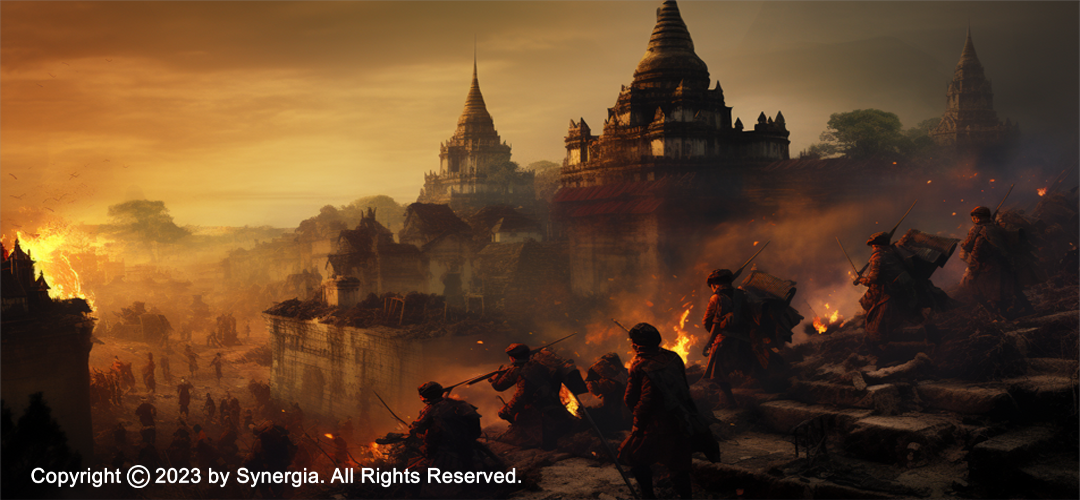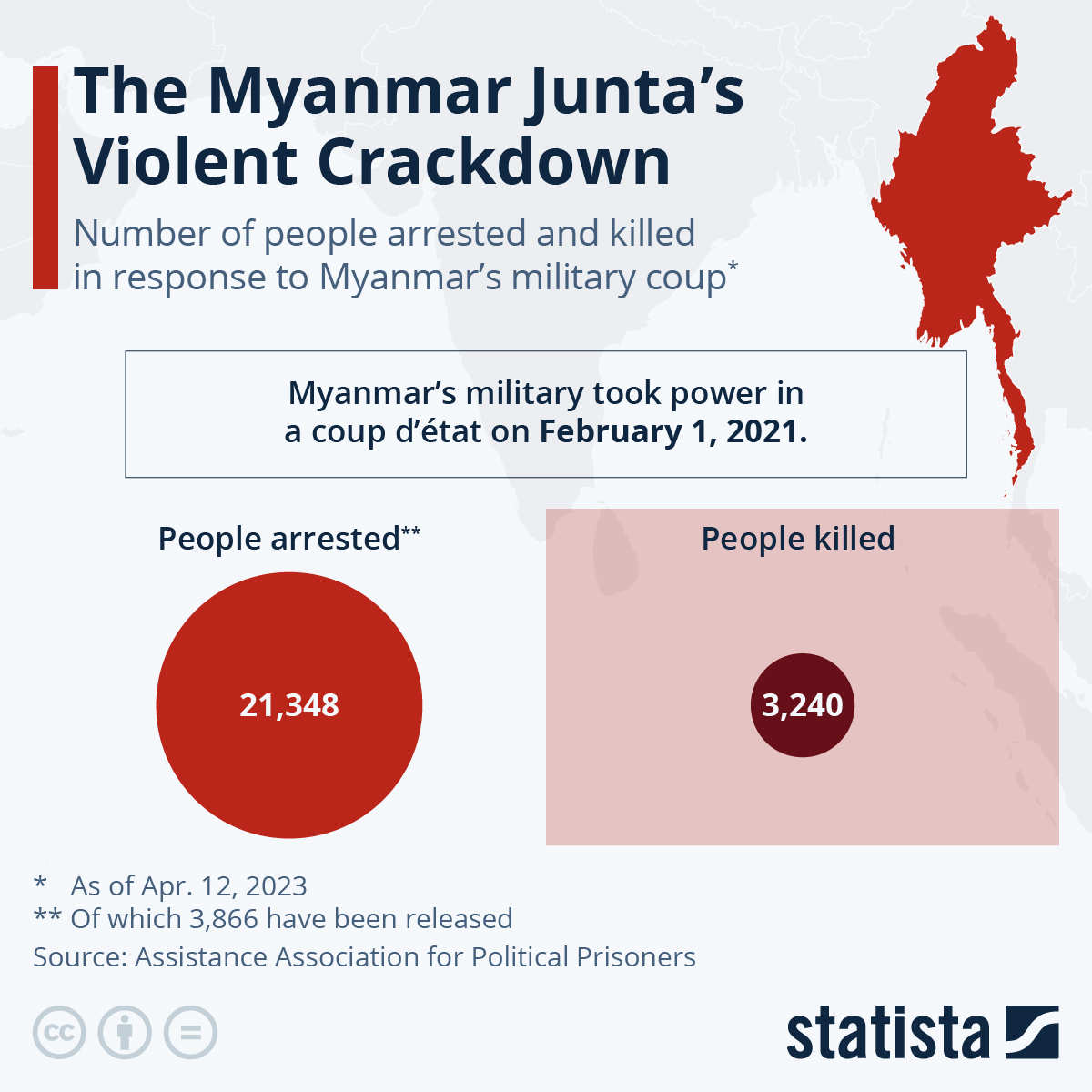Myanmar: a Night Without End
July 15, 2023 | Expert Insights

The civil war in Myanmar has been raging for over two years now, with no end in sight. The military junta (Tatmadaw), which seized power in a coup in February 2021, appears to be in total control, and the world at large seems to have given up on the resistance movement.
Myanmar exemplifies the difficulties in convincing authoritarian regimes to relinquish power, even when almost the entire population wishes to see the last of them. The junta in Myanmar is quite contented in sacrificing the interests and well-being of its people to secure its primacy in the country’s governance and power.
After a spirited international campaign in support of the fledgling democratic resistance soon after the 2021 coup, the international community's interest is flagging as other important global crises grab its attention. This is even a greater tragedy than the suffering of the people of Myanmar.
The international community must find a way to compel the military junta to restore electoral democracy and then, through impartial and fair means, hold them accountable for the years of brutal repression that have been carried out. However, as of date, this hope appears to be no more than just a wish!
Background
The civil war in Myanmar is a complex conflict given the host of ethnic insurgencies that have raged since its independence on 4th January 1948. While many have been brutally suppressed by the military, like the Rohingyas, others, like Chin, Karen and Kachin movements, continue unabatedly. In fact, these tribal factions run their semi-independent fiefdoms within the geographical boundaries of Myanmar and stretch over the territory of neighbouring countries like Thailand and even India. To this complex mix was added the pro-democracy movement post-2021.
The people’s movement can be divided into three main pillars-the Civil Disobedience Movement (CDM), the Committee Representing the Pyidaungsu Hluttaw (CPRH) and National Unity Government (NUG). These are all mass movements and are in addition to the ethnic insurgent movements that predate the mass movement, which comprises Generation Z youth, political and social activists, CSO and NGO leaders, and the artist community.
Sensitive to international censure, initially, the Tatmadaw showed restraint which did not last long. As the democratic mass movement gathered momentum, the junta retaliated with fury, imposing internet lockdowns accompanied by arbitrary arrests and even non-judicial executions.
By May 2021, the situation had escalated out of control and frustrated with the lack of progress through non-violent mass protests, the NUG formed a People's Defence Force (PDF) to wage an armed struggle with the support of the other ethnic armed organisations that have been fighting an insurgence since the 1950s. Since then, violent attacks against the Tatmadaw have escalated throughout the country.
The current situation in Myanmar is dire. According to the Assistance Association for Political Prisoners (AAPP), over 1,800 people have been killed, and over 11,000 have been arrested since the coup. The conflict has also displaced over 1 million people from their homes.
The economy is in shambles, and there is a humanitarian crisis unfolding. The United Nations has warned that Myanmar is facing a "catastrophic" humanitarian crisis, with millions needing food, shelter, and medical care.
The junta is increasingly repressive. It has cracked down on dissent, arresting journalists, activists, and civilians who have spoken out against the coup. The junta has also imposed curfews and shut down the internet in some parts of the country.
There is no end in sight to the conflict. The junta has shown no signs of relenting, and the resistance movement is determined to continue fighting.

Analysis
The international community has tried everything to end the civil war in Myanmar, but nothing has worked. Sanctions have been imposed, but the junta has shown no signs of being affected. Diplomatic pressure has been applied, but the junta has refused to negotiate. And military intervention has been ruled out, as it would likely lead to a wider conflict.
The international community is faced with a difficult choice. It can continue applying pressure on the junta, hoping it will eventually buckle under the strain. It can support the resistance movement, providing it with weapons and training. Or it can focus on humanitarian assistance, helping the millions of people displaced by the conflict.
Each of these options has its drawbacks. Applying pressure on the junta could backfire, leading to even more violence. Supporting the resistance movement could be seen as interference in Myanmar's internal affairs. And focusing on humanitarian assistance could be seen as a way of legitimising the junta.
The international community needs to find a way to end the civil war in Myanmar. The conflict is causing widespread suffering, and it is a threat to regional stability. The international community needs to continue to apply pressure on the junta, but it also needs to be prepared to support the resistance movement if the opportunity arises. The international community should also focus on humanitarian assistance, helping the millions of people who the conflict has displaced.
The civil war in Myanmar is not the only example of an authoritarian state willing to sacrifice its people's interests and well-being for its own survival. North Korea is another such case. The international community has tried everything to get North Korea to change its ways, but so far, nothing has worked.
It is unclear what the best course of action is, but the international community cannot afford to stand by and do nothing.
Assessment
- The fact that the peaceful democratic movement has escalated to an armed struggle shows that the pro-democracy movement is still alive, and its activists are willing to stake their lives to win their freedom from a repressive regime. They need the correct international support to tilt the balance in their favour.
- Sadly, the Tatmadaw is one of the most well-organised and cohesive military structures that has grown in confidence and power over the last 70 years. It has successfully kept several insurgent movements at bay concurrently to maintain its hold over the country, and even when the democratic institution was in power under the Nobel laureate Aung San Suu Kyi (now in prison), they had managed a powerful constitutional role for themselves. Ousting them would not be easy.
- The situation in Myanmar is complex and challenging, but the international community cannot afford to stand by and do nothing. The people of Myanmar need peace, and the international community needs to do everything it can to help them achieve it. Influential neighbours like China, India and Thailand can play a constructive role.








Comments